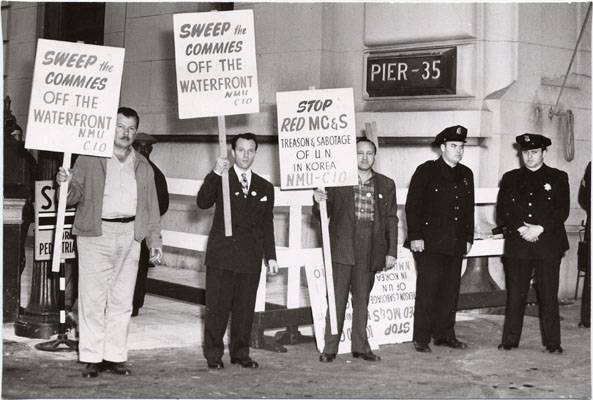 |
| Backlash against unions during the "red scare." |
The referendum has polled well and looks to be supported by a strong majority of Ohio citizens. Let's hope so. Limiting what union members can negotiate to wages only distorts the meaning of both negotiations and benefits. Benefits and defined pensions are wages, pure and simple. In the case of public employees, strong unions that negotiate good benefits and trustworthy pension plans are the reasons why many people choose to work in the public sector where salaries are often lower than what they'd receive in the private sector with comparable education and experience.
I should know. It's one reason I chose to have a late-in-life career as a teacher. The other was, well, I wanted to teach and serve.
Regardless of how it turns out in Ohio today, the message here is that unions have been good for America and the world. The labor movement, along with the progressive drive for workplace, food, and drug safety, has led to some of the biggest improvements in the history of the world. In the long progression from savagery to slavery to feudalism to capitalism to societies governed by the rule of law established by the people, workers' rights have played a vital role.
Workers' rights do more than guarantee a living wage and safe working conditions: they guarantee basic human dignity.
Tell me this:
Who would like to undo work rules protecting children in the workplace?
Who would like to undo workplace safety rules?
Who would like to undo rules concerning hours, breaks, overtime, and the right to have meals on a regular basis?
Who would like to have no set minimum wage?
Who would like workers to have no ability to work together to achieve wage and benefit goals and workplace rules but rather to have to negotiate all terms on an individual basis, often with huge multinational corporations?
Hopefully, very few would like to see a rollback to the days when workers were at the mercy of the moneyed class. If you look at the above list and find that you support the vast majority of the rights enumerated, then you already agree that these rights are vital and thus belong in the category of human rights.
Yes, we could quibble about certain things, such as whether minimum wages are good for business or not, or whether modern corporations -- many of which are richer and better capitalized than at any time in their history -- can afford to offer guaranteed pensions to their workers, but that doesn't mean that workers don't deserve basic guarantees of a living wage, a safe workplace, and essential human dignity.
 |
| The pursuit of happiness |
I fall on the side of the workers, who are the vast majority of human beings. If you are not on that side, whose side are you on? And if you are on a different side, in what way would guaranteeing broad workers' rights not be in your best interests?
Disenfranchising workers leads to uneducated, unhealthy, impoverished lower and middle classes. It is in the best interests of all that every level of society be supported on its way to a healthier, better educated, more capable, and sustainable future. Americans originally called these "unalienable rights" and expressed them as "the right to Life, Liberty, and the pursuit of Happiness." What part of that enduring expression of what is essentially American -- and human -- precludes the inclusion of workers' rights in the company of human rights?



No comments:
Post a Comment